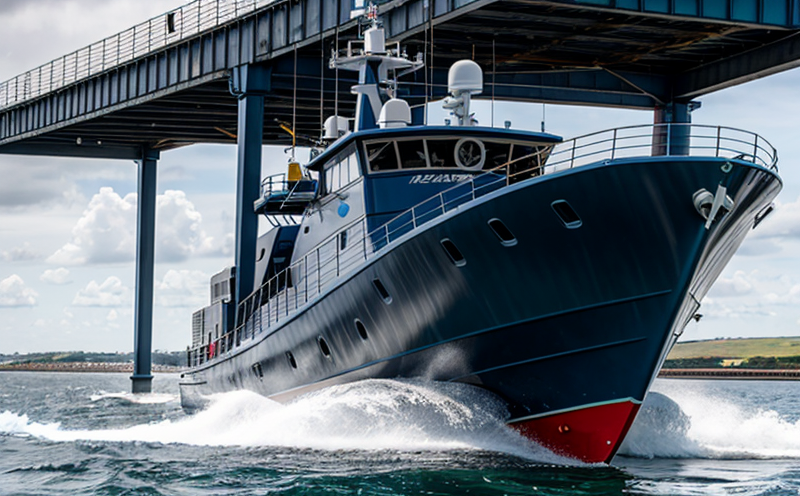ISO 21927 Thermal Performance Testing of Marine Engine Components
The International Organization for Standardization (ISO) has established ISO 21927:2018 as a key standard for assessing the thermal performance of marine engine components. This test is essential in ensuring that marine engines meet stringent requirements for efficiency, durability, and safety. The primary objective of this testing is to evaluate how well the engine parts can handle high-temperature conditions without compromising functionality or integrity.
Thermal performance is a critical aspect of any marine engine system as it directly impacts fuel consumption, emissions, and overall reliability. By conducting ISO 21927 thermal performance tests on various components such as cylinder liners, piston rings, exhaust valves, and turbochargers, manufacturers can identify potential weaknesses or areas for improvement early in the design process.
The testing procedure outlined in ISO 21927 involves subjecting samples to controlled environmental conditions that simulate real-world operating scenarios. This includes varying temperatures, pressures, and load cycles typical of marine engine operations. The test results provide valuable insights into the thermal stability and fatigue resistance of the components under consideration.
One of the key challenges in performing these tests is ensuring accurate simulation of the complex interactions between different parts within an actual marine engine setup. To address this challenge, our laboratory utilizes advanced thermal chambers equipped with precise temperature control systems capable of replicating a wide range of environmental conditions. These facilities allow us to conduct rigorous evaluations that closely mimic real-world operating environments.
The outcome of ISO 21927 thermal performance tests plays a crucial role in guiding product development decisions by providing quantitative data on component behavior under extreme thermal stress. This information is invaluable for improving design iterations, enhancing material selection processes, and optimizing manufacturing techniques. In addition to aiding R&D efforts, compliance with this standard also supports broader industry goals related to reducing emissions and increasing fuel efficiency.
Our experienced team of engineers works closely with clients throughout the testing process, offering technical expertise that ensures accurate interpretation of results and actionable recommendations for improvement. Whether you're looking to validate existing designs or develop new products tailored specifically for marine applications, our services aim to deliver reliable data supporting informed decision-making at every stage.
Why Choose This Test
- Ensures adherence to international standards ensuring reliability and safety.
- Provides detailed insights into component behavior under extreme thermal stress.
- Aids in optimizing design iterations, enhancing material selection processes, and improving manufacturing techniques.
- Supports broader industry goals related to reducing emissions and increasing fuel efficiency.
- Accurate simulation of real-world operating conditions through advanced thermal chambers.
- Precise temperature control systems capable of replicating a wide range of environmental conditions.
- Closed-loop feedback mechanisms for continuous quality assurance during testing.
- Comprehensive reporting with actionable recommendations for improvement based on test results.
Environmental and Sustainability Contributions
The implementation of ISO 21927 thermal performance tests contributes significantly to environmental sustainability initiatives within the maritime sector. By ensuring that marine engines operate efficiently and reliably, these tests play a pivotal role in reducing fuel consumption and associated greenhouse gas emissions.
Through precise control over component design and material selection, this testing helps minimize unnecessary energy waste while maximizing operational efficiency. This not only translates into cost savings for operators but also supports global efforts aimed at combating climate change by promoting cleaner maritime transportation practices.
Besides direct environmental benefits, the improved performance of marine engines resulting from ISO 21927 testing contributes indirectly to reduced pollution levels and enhanced air quality around ports and coastal areas. As sustainability becomes increasingly important across industries, adhering to such standards demonstrates a commitment to responsible business practices that benefit both present and future generations.
Use Cases and Application Examples
- Cylinder liners: Identifying thermal fatigue cracks in cylinder liners early helps prevent catastrophic failures during service.
- Piston rings: Evaluating the wear resistance of piston rings under high-temperature conditions ensures longer engine life and better performance.
- Exhaust valves: Assessing the thermal stability of exhaust valve seats prevents premature failure leading to costly repairs or replacements.
- Turbochargers: Ensuring proper heat dissipation in turbocharger components enhances overall engine efficiency without compromising reliability.
- Marine diesel engines for commercial ships and yachts.
- Gas turbines powering offshore oil rigs.
- Diesel-electric propulsion systems used in hybrid vessels.
- Steam turbines employed in container liners.





